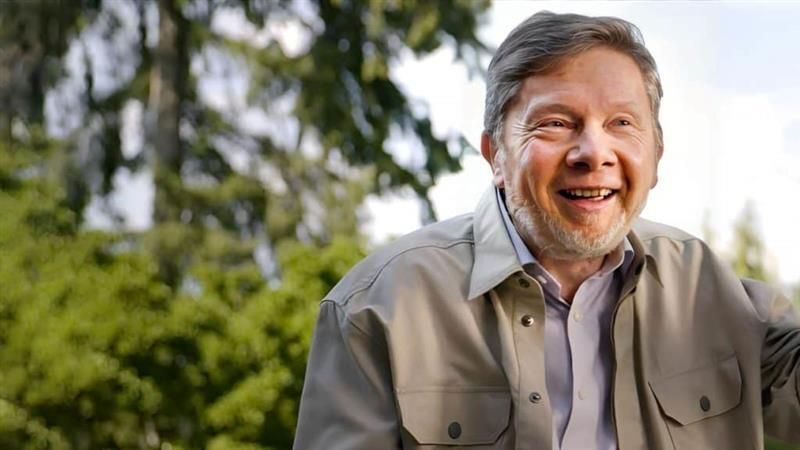Eckhart Tolle: A Voice of Stillness in the Modern World
Eckhart Tolle stands as one of the most influential spiritual teachers of the 21st century, offering a message of presence, inner peace, and awakening that has resonated with millions across cultures and belief systems. Born Ulrich Leonard Tölle in Lünen, Germany in 1948, Tolle endured a troubled and anxious early life that would eventually catalyze a radical personal transformation and fuel his lifelong inquiry into consciousness and the nature of human suffering.
A Profound Awakening
Tolle's early years were marked by despair, anxiety, and existential dread. After studying at the University of London and later working toward a doctorate at Cambridge, Tolle experienced a profound spiritual awakening at the age of 29. He describes reaching a state of extreme despair one night, only to awaken the next morning with his sense of ego dissolved. In his own words, "I couldn’t live with myself any longer. And in that moment, a strange question arose: Who is the 'I' that cannot live with the self?" That existential inquiry triggered what he later described as a state of uninterrupted peace and freedom from compulsive thought, an event that became the foundation of his teaching.
The Power of Now and Global Recognition
Tolle lived in near-seclusion for several years after this awakening, absorbing and deepening his new awareness. Eventually, through word of mouth, people began seeking him out for spiritual guidance. His first and most well-known book, The Power of Now: A Guide to Spiritual Enlightenment, was published in 1997. The book, which emphasizes living fully in the present moment and breaking identification with the egoic mind, quickly garnered international acclaim—especially after being championed by Oprah Winfrey.
In The Power of Now, Tolle distills ancient wisdom into accessible, modern language. Drawing from traditions such as Zen Buddhism, Christian mysticism, Advaita Vedanta, and Sufism, he offers readers tools to disengage from habitual mental patterns and enter a state of alert awareness. The central premise is that true peace and fulfillment are not found in past memories or future imaginings, but in fully inhabiting the Now.
A New Earth and Expanding the Reach
Tolle’s second major work, A New Earth: Awakening to Your Life’s Purpose (2005), extends the teachings of The Power of Now into the social and collective spheres. Here, Tolle addresses the destructive impact of ego not only on individual well-being but also on humanity’s relationship with the planet and one another. He argues for a shift in consciousness that would awaken humanity to a deeper sense of connectedness, compassion, and responsibility.
A New Earth became a global bestseller, further propelled by Oprah Winfrey’s selection of it for her Book Club and her co-hosting of a 10-part live online class with Tolle. Millions joined from around the world, making it one of the largest virtual spiritual gatherings in history. The accessibility and universal tone of Tolle’s work attracted people from all religious and secular backgrounds, establishing him as a bridge between ancient spirituality and contemporary life.
Other Writings and Teachings
In addition to his two most widely known books, Tolle has published several others, including Stillness Speaks (2003), a poetic distillation of spiritual truths, and Guardians of Being (2009), a collaboration with illustrator Patrick McDonnell celebrating the spiritual wisdom of animals and nature. He also established the Eckhart Tolle Foundation and created numerous audio and video teachings, courses, and retreats centered on presence, mindfulness, and awakening consciousness.
Contributions to the Field of Spirituality
Tolle’s core contribution lies in his ability to articulate the timeless essence of spiritual truth in clear, contemporary terms. His teachings are notably non-dogmatic, transcending the boundaries of organized religion while honoring the shared mystical wisdom embedded in all spiritual traditions. He is often credited with helping bring mindfulness, presence, and the “observing self” into the mainstream cultural lexicon.
What distinguishes Tolle is not just his teaching but his presence. Listeners and readers often describe experiencing a calming, spacious quality when engaging with his words—whether in print or spoken form. His influence is visible in wellness and mental health conversations, interfaith dialogue, leadership coaching, and education initiatives that emphasize emotional and spiritual intelligence.
Conclusion
Eckhart Tolle is a quiet revolutionary. Without grandstanding or religious zeal, he has helped usher in a new consciousness for millions seeking meaning and sanity in a rapidly changing, chaotic world. His life and work are testaments to the transformative power of awareness and the deep human yearning for inner peace. In an era often dominated by distraction and division, Tolle’s invitation to return to the present moment—calm, awake, and whole—offers both a balm and a blueprint for a more compassionate humanity.


